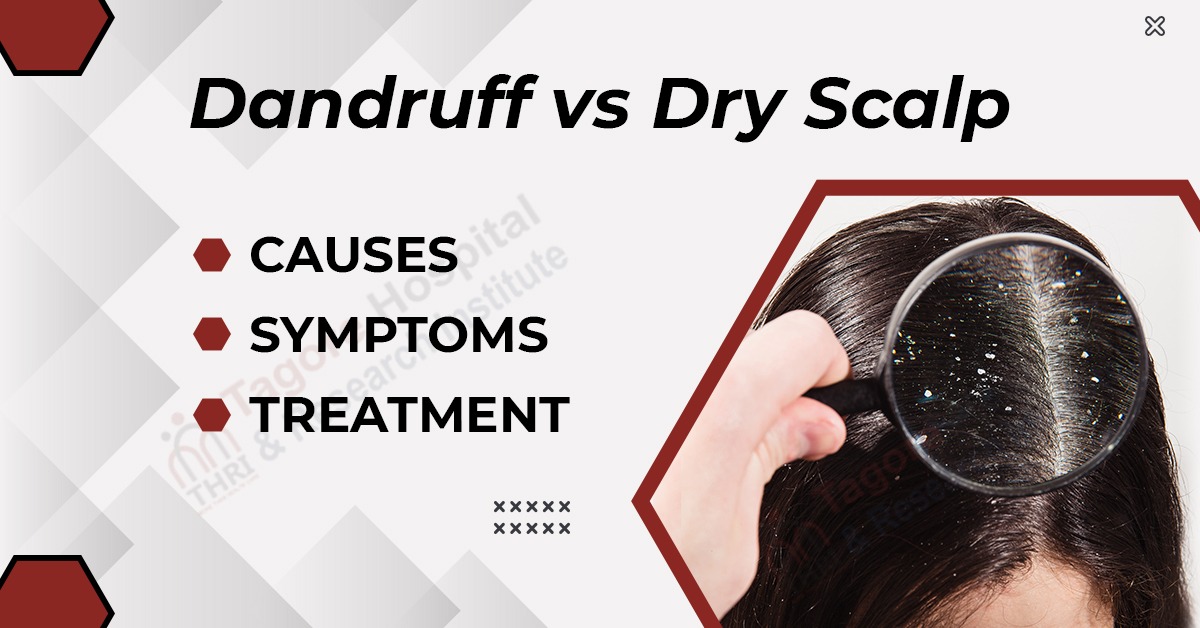- By Tagore Hospital
- Posted July 15, 2025
Introduction
Facial expressions of pain, embarrassment, and frustration commonly mark the scalp psoriasis condition so often misunderstood and yet common. A chronic skin condition with the peculiar characteristic of having thick patches of inflamed skin covered with silvery-white scales on the scalp, this Disease presents a whole different challenge in diagnosis and treatment in particular.
While it is Psoriasis, an autoimmune disease of the skin, in fact there are certain peculiarities that scalp psoriasis brings in its wake with respect to diagnosis and treatment. In this blog, we shall discuss symptoms, causes, treatments, and other relevant information concerning scalp psoriasis to present an in-depth understanding.
What is Scalp Psoriasis?
Scalp psoriasis is a condition that arises when psoriasis involves the scalp. Psoriasis is one of the most prevalent disorders affecting the scalp, nearly half of the diagnosed population presenting with it.
Psoriasis is a chronic autoimmune disorder in nontechnical layman terminology; it occurs when the immune system attacks the actual skin cells erroneously, succeeding rapid skin-turnover that culminates in characteristic red inflamed couperose patches eroded with thick, silvery scales.
The scalp, an area with dense hair follicles, offers unique testing, treatment, and management challenges. It can either be restricted patches or cover the larger portion of the scalp, spreading up to the forehead, the neck, and extending behind the ears. Though not a contagious disease, it can become so very visible, which would bring about emotional distress in many.
You can read also:-How to Stop Vomiting in Pregnancy Home Remedies?
Symptoms of Scalp Psoriasis
Symptoms of scalp psoriasis may be very different from one individual to another, going from mild irritation to severe flare-ups. Some common symptoms and signs are as follows:
- Red Patches: Red Patches forming raised on the scalp are mainly signs of scalp psoriasis. These patches may be more or less prominent according to the severity of the case.
- Silver or White Scales: Such red patches will be covered by thick, silvery-white scales due to the rapid accumulation of dead skin. The scales can sometimes break off to cause dandruff-like symptoms.
- Itching and Discomfort: Intense itching is one of the most distressing symptoms of scalp psoriasis. The affected areas can go through fabulous pain and itching that causes discomfort throughout the day and even hinders sleep at night.
- Dryness and Crusting: The skin looks dry, and sometimes it can even crack and bleed. Then, really unsightly crusty patches start to form on the scalp, which are uncomfortable to deal with.
- Hair Loss: At times, scalp psoriasis can cause temporary hair loss. This usually occurs when the psoriasis is severe and individuals scratch or pick at areas that are inflamed. But hair loss is mostly reversible once the psoriasis is cleared up.
- Burning Sensation: Some patients with scalp psoriasis tell of a burning or stinging feeling on their scalps, which intensifies their discomfort.
Causes of Scalp Psoriasis
Similar to other types of psoriasis, the actual cause of scalp psoriasis is not fully known. However, it is generally considered to involve some sort of overstimulation of the immune system or genetic factors. Here are some given causes:
Immune system dysfunction: Psoriasis is an autoimmune disorder, meaning the immune system attacks itself instead of foreign substances. In scalp psoriasis, the immune system mistakenly triggers an accelerated turnover of skin cells, so they build up on the scalp and result in typical red, scaly patches.
- Genetic Factors: It is highly accepted that inherited factors have a significant role in the development of psoriasis. Those with psoriasis in the family or with other autoimmune disorders present an increased probability of developing scalp psoriasis themselves. Specific genes particularly related to the immune system have been implicated as risk factors for developing the condition.
- Environmental Triggers: Environmental triggers may trigger or worsen scalp psoriasis. Some of the commonly listed triggers are:
- Stress: Emotional or physical stress is one of the cardinal triggers for flare-up of psoriasis.
- Infections: Infections, especially streptococcal infections, predispose to the onset of the disease mainly in childhood.
- Weather: Cold, dry weather likely exacerbates scalp psoriasis, whereas warm, humid conditions fairly relieve symptoms.
- Medications: Some medications are said to induce or aggravate symptoms of psoriasis, for instance, lithium and antimalarials.
- Skin Injury: Injury like cut, scratch, or even sunburn on the scalp will lead to a psoriatic eruption or flare-up, termed as Koebner's response.
You can read also:-Ultrasound in Pregnancy: What to Expect, Purpose, Procedure & Results
Treatment Options for Scalp Psoriasis
There are many different methods for treating the symptoms and preventing flare-ups since there is no cure for scalp psoriasis. Firstly, treatment is use to remove scales, reduce inflammation, and relieve itching and discomfort. Depending on the severity of the patient, different treatment approaches can be taken. Common ones are as follows.
1. Topical treatments
Topical treatment is use to deal with scalp psoriasis. Treatments aim to lessen inflammation, control skin cell buildup, and reduce itching. Treatments for topical application include the following:
- Corticosteroids: These prescription-strength topical corticosteroids are used for calming inflammation and redness due to psoriasis. They come in the form of creams, ointments, and sometimes medicated shampoos. Overuse of corticosteroids, however, can have its own be downside. Thinning of the skin is one of the adverse effects.
- Vitamin D analogues: Calcipotriene (often used for slowing down the skin cell production and reducing the scaling) can be applied in the form of a topical ointment or shampoo.
- Coal Tar: Coal tar has been used since the olden days for psoriasis. It slows down the rate of growth of skin cells and reduces inflammation. Coal tar is present in most over-the-counter, shampoos, and ointments.
- Topical Retinoids: Tazarotene, a topical retinoid given for the purposes of diminishing inflammation while encouraging the shedding of skin cells.
- Salicylic Acid: An agent found mostly in shampoos and creams, and it helps to break down thick scaling on the scalp.
2. Phototherapy
When scalp psoriasis goes severe, it is time to consider phototherapy. There is ultraviolet (UV) light radiation being thrown onto the skin in fully controlled environments. UVB light therapy, therefore, has the power to slow down the rapid growth of skin cells and thereby diminish the symptoms over time.
3. Systemic Treatments
If the topical treatments and phototherapy do not solve the problem this is when medicines that come with oral injections (systemic treatment) could be given. These treatments work to suppress the immune system and reduce inflammation all around the body. The most common ones are:
- Methotrexate: A medicine to calm down the immune system and reduce inflammation.
- Biologics: Biologics, like adalimumab or etanercept, intervene in the immune pathways to curb inflammation.
- Cyclosporine: It is an immunosuppressant drug that can kick into the scene in treating patients with severe psoriasis.
4. Home Remedies and Lifestyle Changes
Some lifestyle changes and home remedies may be handy alongside treatment for scalp psoriasis:
- Keeping it moist: Frequent application of a mild moisturizer or natural oils, such as coconut oil or olive oil, can alleviate dryness and scaling.
- Gentle hair care: Using gentle shampoos free of fragrance, and avoiding exposing hair to excess heat or any chemical treatments, will keep irritation at bay.
- Stress management: Such stress-relieving activities include yoga, meditation, or deep breathing exercises, which help decrease flare-ups.
- Dietary changes: Some sufferers report that certain food items, e.g., omega-3 rich foods, help reduce incidence of inflammation.
Further Insights on Scalp Psoriasis
Scalp psoriasis management does not are just meant for the treatment of physical symptoms on body; it also considers the emotional and psychological aspects of a certain disorder. The obvious manifestations of certain disorders can ignite feelings of self-consciousness or embarrassment; therefore, it is paramount that persons suffering from psoriasis seek help from their friends or a mental health professional.
Moreover, better oneself to be proactive in managing flare-ups by keeping track of triggers, maintaining a regular skincare routine, and following up with a healthcare provider for the long-term management of their condition.
Conclusion
At Tagore Hospital Jaipur, we know all too well how difficult and emotionally draining scalp psoriasis can be. The area affected is very relevant not only to health issues but also to your emotional health and self-esteem. Our teams of dermatologists and other healthcare professionals can offer specialized care that will fit your specific need to hopefully get you efficiently in control of the condition.
With a combination of medications, lifestyle changes, and support, scalp psoriasis can be managed, which will allow you to live comfortably and confidently. Our hospital has many options for scalp psoriasis treatment including topical medicines, phototherapy, and systemic treatments, which will be individualized to your specific needs.
Furthermore, we believe in equipping our patients with the knowledge and resources to manage their own condition. We help our patients identify triggers and better evaluate their skincare and stress management to minimize outbreaks and have more control of their health.
Tagore Hospital cares about your well-being. If you or a person you know is experiencing difficulty with scalp psoriasis, don’t delay. Our team is available to help when you are ready to take action on your path to better skin and overall health. Give us a call today to set up an appointment and start your road to healthier living.
Tags





